广东省佛山市顺德区江义初级中学外研版八年级下学期英语课件:Module 4 Seeing the doctor Unit 3 Language in use (共32张PPT)
文档属性
| 名称 | 广东省佛山市顺德区江义初级中学外研版八年级下学期英语课件:Module 4 Seeing the doctor Unit 3 Language in use (共32张PPT) | 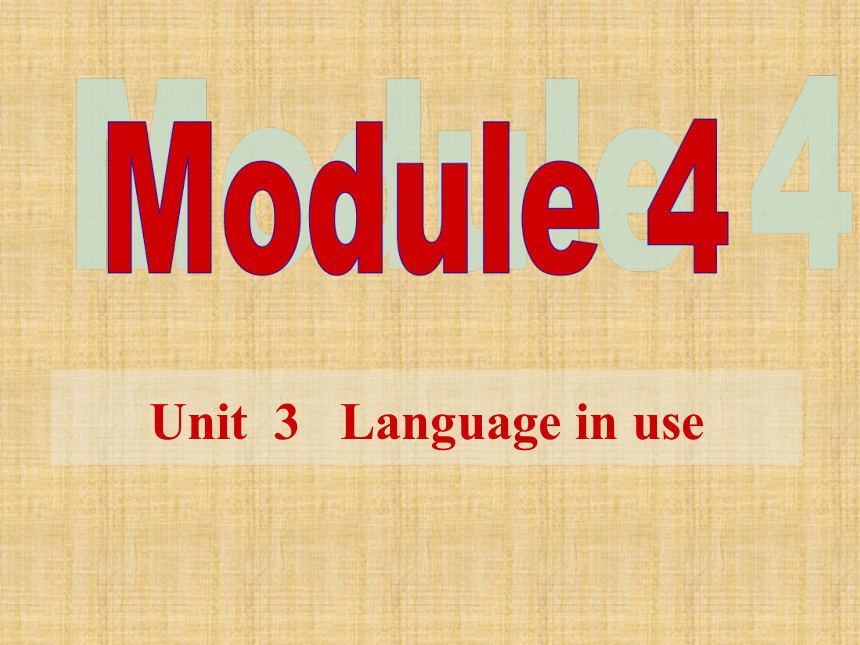 | |
| 格式 | zip | ||
| 文件大小 | 365.4KB | ||
| 资源类型 | 教案 | ||
| 版本资源 | 外研版 | ||
| 科目 | 英语 | ||
| 更新时间 | 2016-04-23 17:55:45 | ||
图片预览

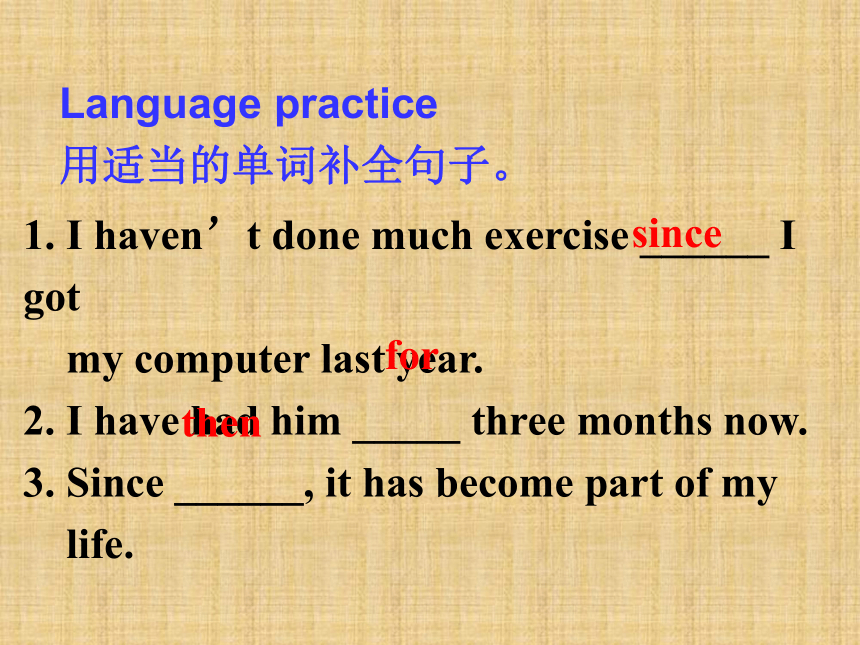
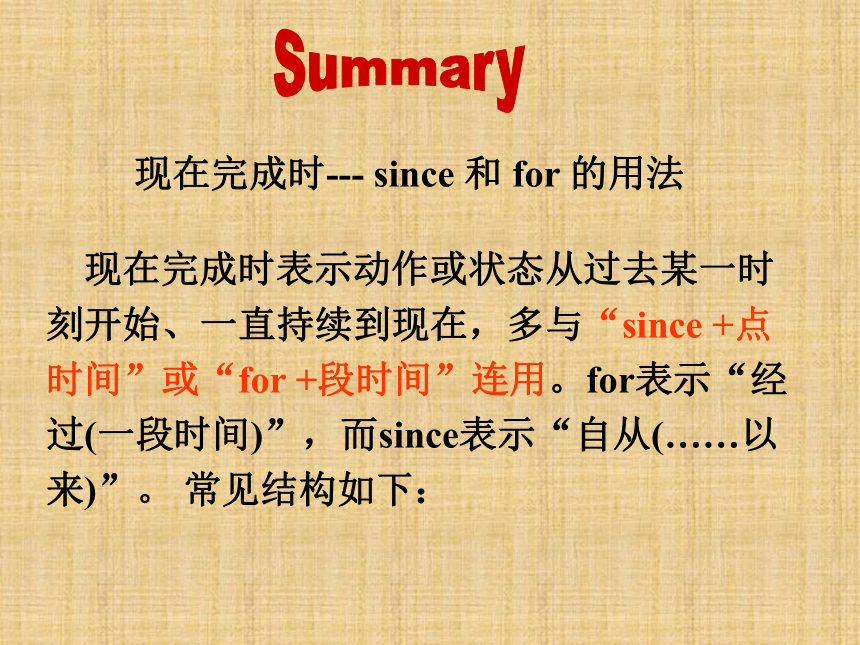
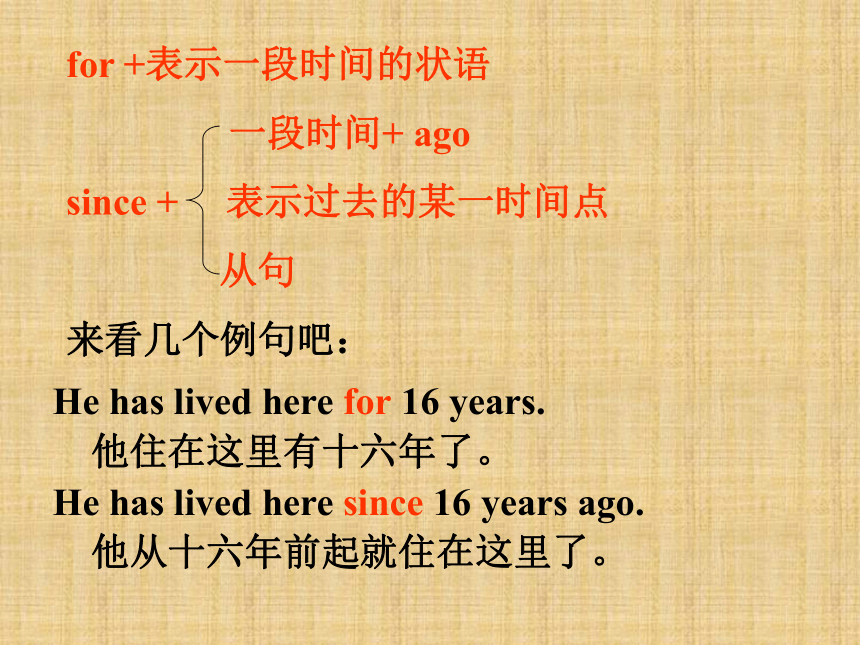
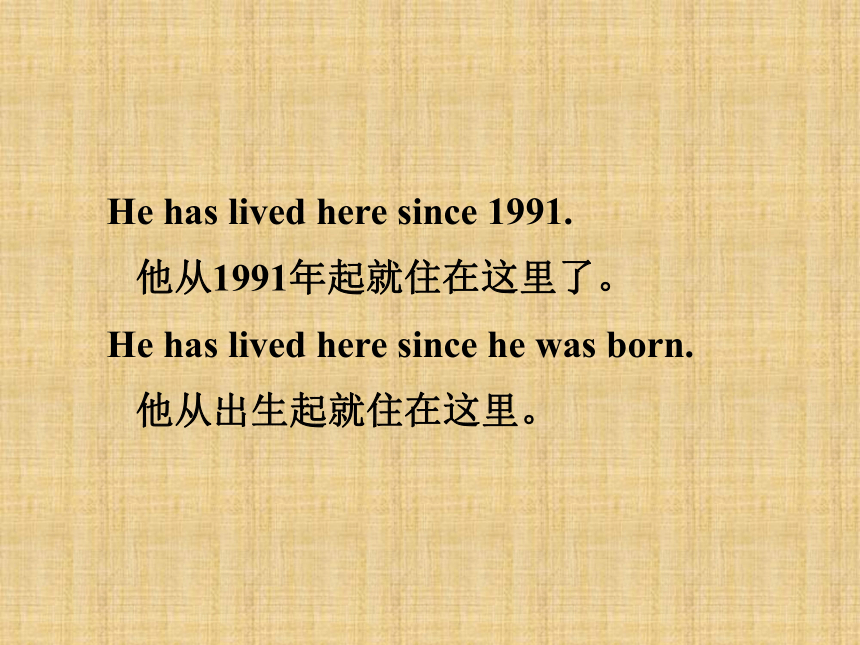
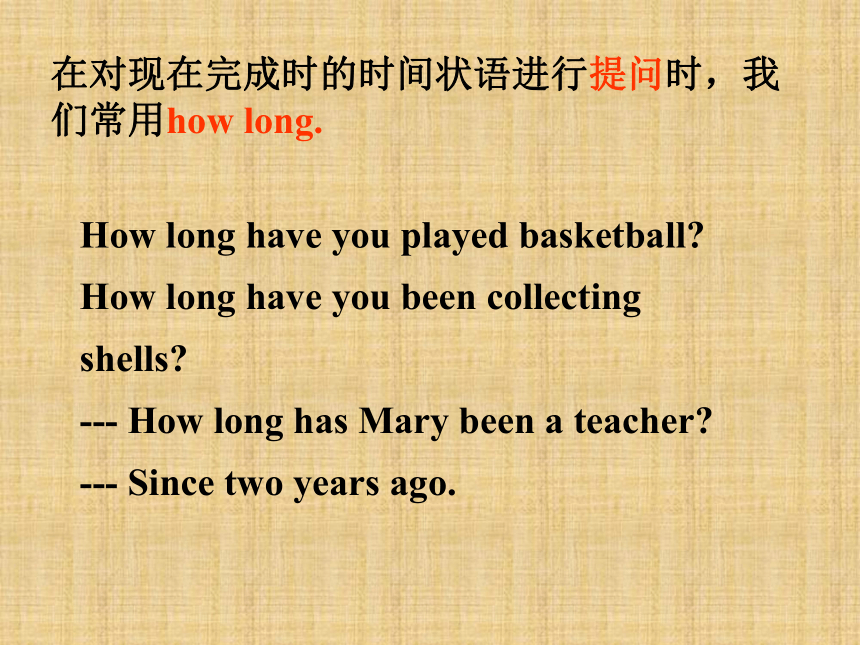
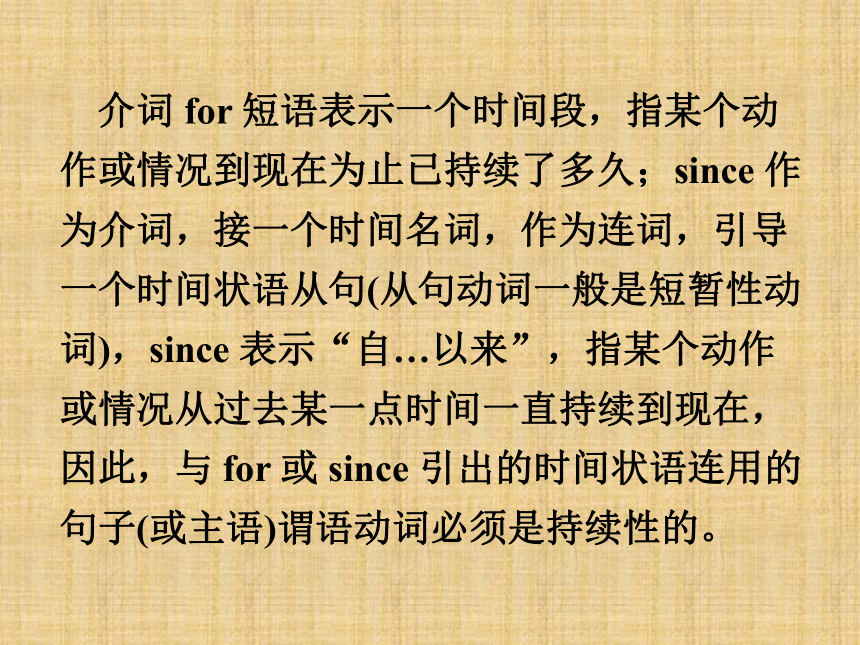
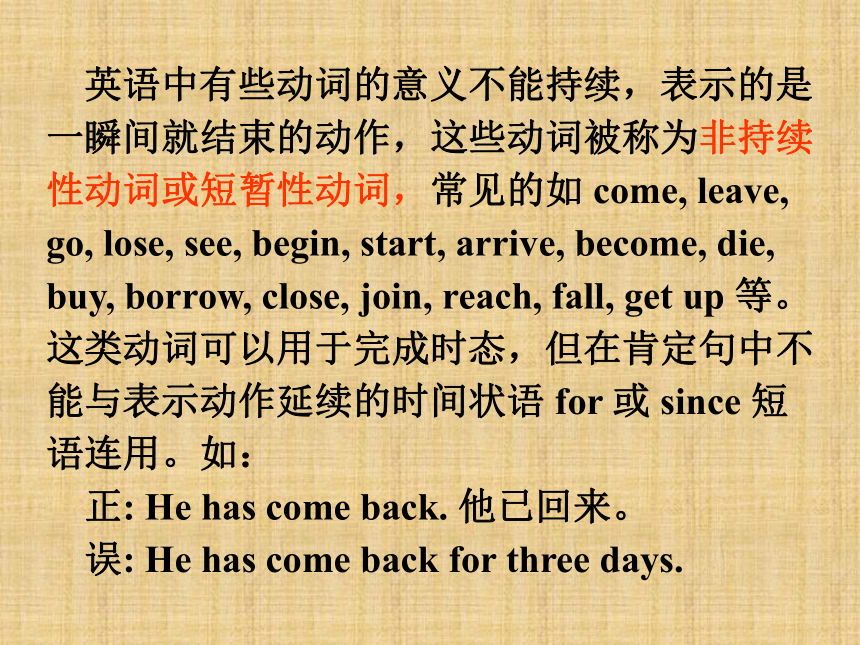

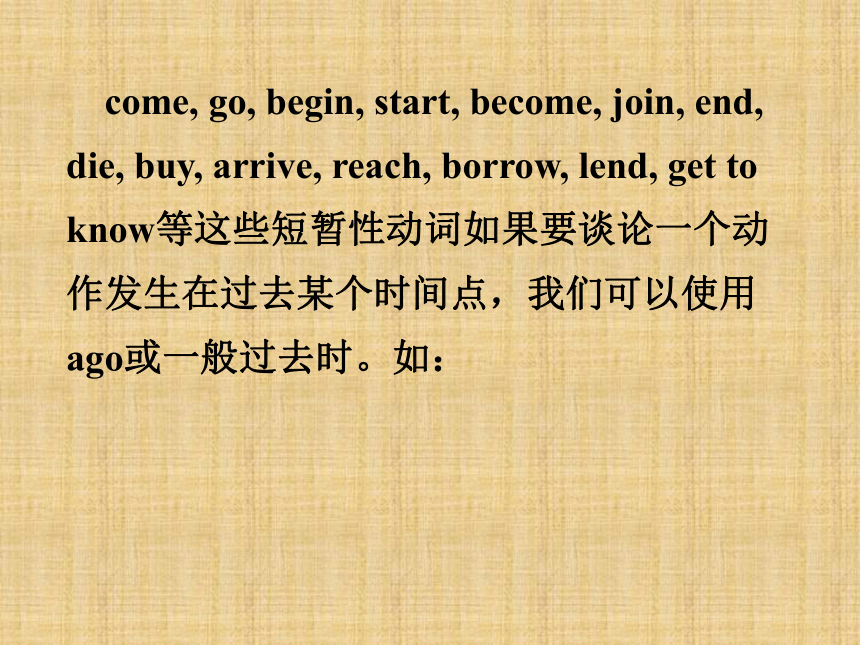
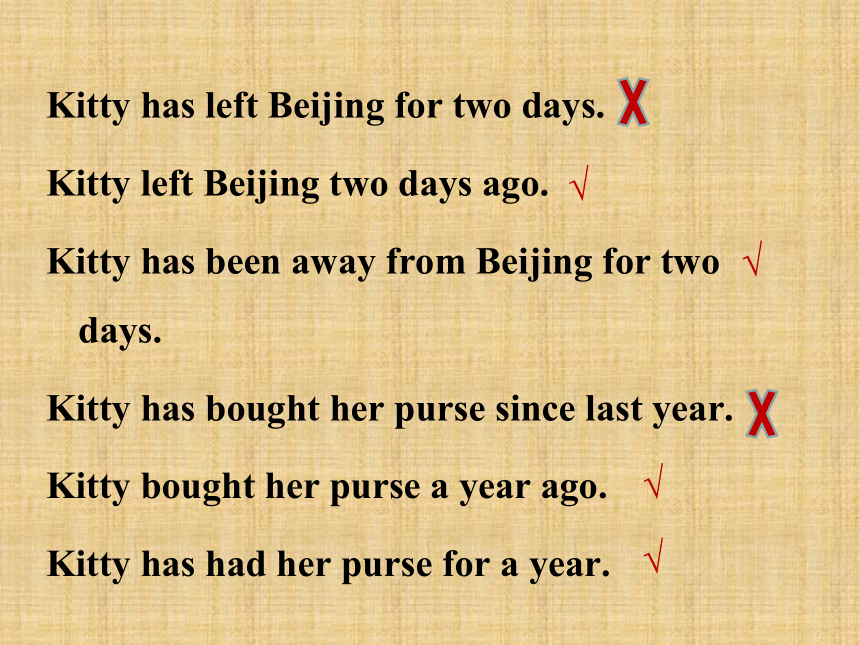
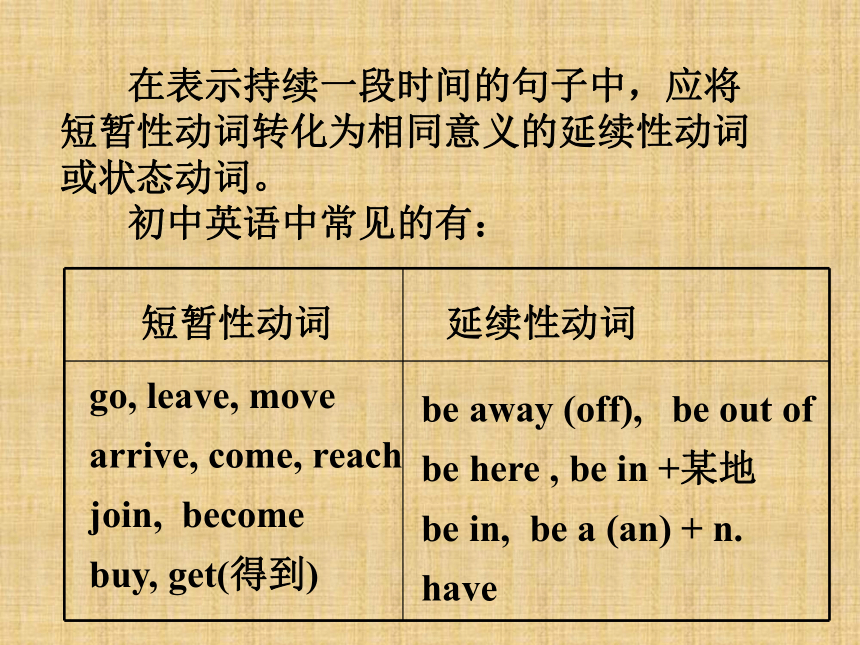
文档简介
课件32张PPT。 Module 4Unit 3 Language in use1. I haven’t done much exercise ______ I got
my computer last year.
2. I have had him _____ three months now.
3. Since ______, it has become part of my
life.forsincethenLanguage practice
用适当的单词补全句子。 现在完成时表示动作或状态从过去某一时刻开始、一直持续到现在,多与“since +点时间”或“for +段时间”连用。for表示“经过(一段时间)”,而since表示“自从(……以来)”。 常见结构如下:Summary现在完成时--- since 和 for 的用法He has lived here for 16 years.
他住在这里有十六年了。
He has lived here since 16 years ago.
他从十六年前起就住在这里了。He has lived here since 1991.
他从1991年起就住在这里了。
He has lived here since he was born.
他从出生起就住在这里。在对现在完成时的时间状语进行提问时,我们常用how long.How long have you played basketball?
How long have you been collecting shells?
--- How long has Mary been a teacher?
--- Since two years ago. 介词 for 短语表示一个时间段,指某个动作或情况到现在为止已持续了多久;since 作为介词,接一个时间名词,作为连词,引导一个时间状语从句(从句动词一般是短暂性动词),since 表示“自…以来”,指某个动作或情况从过去某一点时间一直持续到现在,因此,与 for 或 since 引出的时间状语连用的句子(或主语)谓语动词必须是持续性的。 英语中有些动词的意义不能持续,表示的是一瞬间就结束的动作,这些动词被称为非持续性动词或短暂性动词,常见的如 come, leave, go, lose, see, begin, start, arrive, become, die, buy, borrow, close, join, reach, fall, get up 等。这类动词可以用于完成时态,但在肯定句中不能与表示动作延续的时间状语 for 或 since 短语连用。如:
正: He has come back. 他已回来。
误: He has come back for three days. 若要表示“他回来已三天了”这样的意思,可以将动词改为延续性动词,或改变时间状语,或改用别的句型等,如译为:
He has been back for three days. (改变谓语动词)
He has been back since three days ago. (改变谓语动词)
He came back three days ago. (改变时间状语及动词时态)
It’s three days since he came back. (改变句型) come, go, begin, start, become, join, end, die, buy, arrive, reach, borrow, lend, get to know等这些短暂性动词如果要谈论一个动作发生在过去某个时间点,我们可以使用ago或一般过去时。如:Kitty has left Beijing for two days.
Kitty left Beijing two days ago.
Kitty has been away from Beijing for two days.
Kitty has bought her purse since last year.
Kitty bought her purse a year ago.
Kitty has had her purse for a year.√√√√ 在表示持续一段时间的句子中,应将短暂性动词转化为相同意义的延续性动词或状态动词。
初中英语中常见的有: 短暂性动词延续性动词go, leave, move
arrive, come, reach
join,? become
buy, get(得到)be away (off),?? be out of
be here , be in +某地
be in,? be a (an) + n.
have短暂性动词延续性动词fall ill (asleep)
finish, end
begin , start
begin to learn (work, read, rain)
go out
get up
borrow
get to know
die
losebe ill (asleep)
be over
be on
learn, work , read,? rain
be out
be up
keep
know
be dead
be lost 非持续性动词用于完成时态,在肯定句中不能与for 或 since引出的短语(或句子)连用,但在否定句中是可以的,因为一个非延续性动词一旦被否定即成为状态,而状态总是可以延续的。如:
I haven’t seen him for a long time.
我很久没见到他了。
He hasn’t come here for some time.
他有段时间没来了。
I haven’t heard from her since she left.
自她离开以后,我一直没收到她的来信。 真题链接( ) 1. —Excuse me, where is Mr. Brown's office?
—Sorry, I don't know. I_____ here for only a few days.
A. work B. worked
C. have worked D. will workC( ) 2. My grandmother ______ a lot of changes in Tianjin since she came here.
A.sees B. can see
C. will see D. has seenD( ) 3. I many new friends since I came here.
A. make B. made
C. will make D. have madeD( ) 4. My aunt is a writer. She ____ more than ten books since 1980.
A. writes B. wrote
C. has written D. will writeC( ) 5. I ____ Mr. Smith since he moved to Shanghai.
A. didn’t hear from B. don’t hear from
C. won’t hear from D. haven’t heard fromD( ) 6. Not only Jam but also his parents ______ a few interesting places since they came to China.
A. will visit B. has visited
C. have visited D. visited C( ) 7. —Look at these stamps. I_____them for five years.
—Wow, they are wonderful.
A. kept B. have kept C. have boughtB( ) 8. He_____ for ten years.
A. has been married B. married
C. got married D. has marriedA( ) 9. My sister has learnt English_____.
A. for twelve years ago
B. since she was four
C. twelve years ago
D. at the age of fourB( ) 10. She ________ the book ________ two days ago.
A. has borrowed; since
B. has kept; since
C. kept; forBPractice 用括号内词的正确形式填空。The old man ________(live) here since 1992.
_____ you _______(visit) our factory yet?
I __________ (not see) you for a long time. You _____________(change) a lot.
I’m afraid I __________(keep) you waiting for a long time.
He __________(know) the city since he was very young.has livedHavevisitedhaven’t seenhave changedhave kepthas known选用 for和 since填空:
1.We haven’t seen each other ______ a long time.
2.His father has been in the Party ______ 10 years ago.
3.The film has been on ______ 20 minutes.forsincefor4. Mr Green has worked here ______ he came to China.
5. His grandparents have been dead ______ several years.
6. It’s five years _______ we met last time.sinceforsince用for或since完成下列句子。
1. Jill is in Ireland now. She arrived there three days ago.
She has been there for three days.
2. Jack is here. He arrived here on Tuesday.
He has ______________________________.?
3. I know Sue. I first met Sue two years ago.
I’ve ___________________________________ ____________.been here since Tuesday.known Sue since two years ago./for two years. 4.?I have a camera. I bought it in 1989.
__________________________________.
5.?Dave plays the piano. He started when he was seven years old.
__________________________________________________.I have had the camera since 1989. Dave has played the piano since he was seven years old.Read the passage and match the problems with the advice.1.b2.a3.cWork in pairs. Do you have similar problems? Talk about your advice.Listen and complete the passage.The man feels _________. He is hot and ___________. He has been like this for about __________. He has got a temperature and a _________ but has not got a ___________ or a cough. The doctor suggests he should ________________ and take the medicine __________ a day. And he should _________ until he feels better. awfulvery tiredthree daysheadachestomachachedrink more waterthree timesstay in bedThe World Health OrganizationAround the world1. When was the World Health Organization set up?It was set up in 1948.2. What is the work of World Health Organization? It helps ordinary people all over the world. It cures, prevents and controls serious diseases, and educates people about how to protect their health.Flag of the World Health OrganizationWHO Headquarters in GenevaAbout WHO WHO is the directing and coordinating(协调) authority for health within the United Nations system. It is responsible for providing leadership on global health matters, shaping the health research agenda, setting norms and standards, articulating evidence-based policy options, providing technical support to countries and monitoring(监测) and assessing health trends. In the 21st century, health is a shared responsibility, involving equitable access to essential care and collective defence against transnational threats.Doing a survey to find the most suitable exerciseModule taskDo a survey to find what exercise your group members do and the effects.What exercise do you often do?
When did you begin doing it?
How often do you do it?
Is it good for you?
How do you feel after you do the exercise?
my computer last year.
2. I have had him _____ three months now.
3. Since ______, it has become part of my
life.forsincethenLanguage practice
用适当的单词补全句子。 现在完成时表示动作或状态从过去某一时刻开始、一直持续到现在,多与“since +点时间”或“for +段时间”连用。for表示“经过(一段时间)”,而since表示“自从(……以来)”。 常见结构如下:Summary现在完成时--- since 和 for 的用法He has lived here for 16 years.
他住在这里有十六年了。
He has lived here since 16 years ago.
他从十六年前起就住在这里了。He has lived here since 1991.
他从1991年起就住在这里了。
He has lived here since he was born.
他从出生起就住在这里。在对现在完成时的时间状语进行提问时,我们常用how long.How long have you played basketball?
How long have you been collecting shells?
--- How long has Mary been a teacher?
--- Since two years ago. 介词 for 短语表示一个时间段,指某个动作或情况到现在为止已持续了多久;since 作为介词,接一个时间名词,作为连词,引导一个时间状语从句(从句动词一般是短暂性动词),since 表示“自…以来”,指某个动作或情况从过去某一点时间一直持续到现在,因此,与 for 或 since 引出的时间状语连用的句子(或主语)谓语动词必须是持续性的。 英语中有些动词的意义不能持续,表示的是一瞬间就结束的动作,这些动词被称为非持续性动词或短暂性动词,常见的如 come, leave, go, lose, see, begin, start, arrive, become, die, buy, borrow, close, join, reach, fall, get up 等。这类动词可以用于完成时态,但在肯定句中不能与表示动作延续的时间状语 for 或 since 短语连用。如:
正: He has come back. 他已回来。
误: He has come back for three days. 若要表示“他回来已三天了”这样的意思,可以将动词改为延续性动词,或改变时间状语,或改用别的句型等,如译为:
He has been back for three days. (改变谓语动词)
He has been back since three days ago. (改变谓语动词)
He came back three days ago. (改变时间状语及动词时态)
It’s three days since he came back. (改变句型) come, go, begin, start, become, join, end, die, buy, arrive, reach, borrow, lend, get to know等这些短暂性动词如果要谈论一个动作发生在过去某个时间点,我们可以使用ago或一般过去时。如:Kitty has left Beijing for two days.
Kitty left Beijing two days ago.
Kitty has been away from Beijing for two days.
Kitty has bought her purse since last year.
Kitty bought her purse a year ago.
Kitty has had her purse for a year.√√√√ 在表示持续一段时间的句子中,应将短暂性动词转化为相同意义的延续性动词或状态动词。
初中英语中常见的有: 短暂性动词延续性动词go, leave, move
arrive, come, reach
join,? become
buy, get(得到)be away (off),?? be out of
be here , be in +某地
be in,? be a (an) + n.
have短暂性动词延续性动词fall ill (asleep)
finish, end
begin , start
begin to learn (work, read, rain)
go out
get up
borrow
get to know
die
losebe ill (asleep)
be over
be on
learn, work , read,? rain
be out
be up
keep
know
be dead
be lost 非持续性动词用于完成时态,在肯定句中不能与for 或 since引出的短语(或句子)连用,但在否定句中是可以的,因为一个非延续性动词一旦被否定即成为状态,而状态总是可以延续的。如:
I haven’t seen him for a long time.
我很久没见到他了。
He hasn’t come here for some time.
他有段时间没来了。
I haven’t heard from her since she left.
自她离开以后,我一直没收到她的来信。 真题链接( ) 1. —Excuse me, where is Mr. Brown's office?
—Sorry, I don't know. I_____ here for only a few days.
A. work B. worked
C. have worked D. will workC( ) 2. My grandmother ______ a lot of changes in Tianjin since she came here.
A.sees B. can see
C. will see D. has seenD( ) 3. I many new friends since I came here.
A. make B. made
C. will make D. have madeD( ) 4. My aunt is a writer. She ____ more than ten books since 1980.
A. writes B. wrote
C. has written D. will writeC( ) 5. I ____ Mr. Smith since he moved to Shanghai.
A. didn’t hear from B. don’t hear from
C. won’t hear from D. haven’t heard fromD( ) 6. Not only Jam but also his parents ______ a few interesting places since they came to China.
A. will visit B. has visited
C. have visited D. visited C( ) 7. —Look at these stamps. I_____them for five years.
—Wow, they are wonderful.
A. kept B. have kept C. have boughtB( ) 8. He_____ for ten years.
A. has been married B. married
C. got married D. has marriedA( ) 9. My sister has learnt English_____.
A. for twelve years ago
B. since she was four
C. twelve years ago
D. at the age of fourB( ) 10. She ________ the book ________ two days ago.
A. has borrowed; since
B. has kept; since
C. kept; forBPractice 用括号内词的正确形式填空。The old man ________(live) here since 1992.
_____ you _______(visit) our factory yet?
I __________ (not see) you for a long time. You _____________(change) a lot.
I’m afraid I __________(keep) you waiting for a long time.
He __________(know) the city since he was very young.has livedHavevisitedhaven’t seenhave changedhave kepthas known选用 for和 since填空:
1.We haven’t seen each other ______ a long time.
2.His father has been in the Party ______ 10 years ago.
3.The film has been on ______ 20 minutes.forsincefor4. Mr Green has worked here ______ he came to China.
5. His grandparents have been dead ______ several years.
6. It’s five years _______ we met last time.sinceforsince用for或since完成下列句子。
1. Jill is in Ireland now. She arrived there three days ago.
She has been there for three days.
2. Jack is here. He arrived here on Tuesday.
He has ______________________________.?
3. I know Sue. I first met Sue two years ago.
I’ve ___________________________________ ____________.been here since Tuesday.known Sue since two years ago./for two years. 4.?I have a camera. I bought it in 1989.
__________________________________.
5.?Dave plays the piano. He started when he was seven years old.
__________________________________________________.I have had the camera since 1989. Dave has played the piano since he was seven years old.Read the passage and match the problems with the advice.1.b2.a3.cWork in pairs. Do you have similar problems? Talk about your advice.Listen and complete the passage.The man feels _________. He is hot and ___________. He has been like this for about __________. He has got a temperature and a _________ but has not got a ___________ or a cough. The doctor suggests he should ________________ and take the medicine __________ a day. And he should _________ until he feels better. awfulvery tiredthree daysheadachestomachachedrink more waterthree timesstay in bedThe World Health OrganizationAround the world1. When was the World Health Organization set up?It was set up in 1948.2. What is the work of World Health Organization? It helps ordinary people all over the world. It cures, prevents and controls serious diseases, and educates people about how to protect their health.Flag of the World Health OrganizationWHO Headquarters in GenevaAbout WHO WHO is the directing and coordinating(协调) authority for health within the United Nations system. It is responsible for providing leadership on global health matters, shaping the health research agenda, setting norms and standards, articulating evidence-based policy options, providing technical support to countries and monitoring(监测) and assessing health trends. In the 21st century, health is a shared responsibility, involving equitable access to essential care and collective defence against transnational threats.Doing a survey to find the most suitable exerciseModule taskDo a survey to find what exercise your group members do and the effects.What exercise do you often do?
When did you begin doing it?
How often do you do it?
Is it good for you?
How do you feel after you do the exercise?
同课章节目录
- Module 1 Feelings and impressions
- Unit 1 It smells delicious.
- Unit 2 I feel nervous when I speak Chinese .
- Unit 3 Language in use
- Module 2 Experiences
- Unit 1 I've also entered lots of speaking competi
- Unit 2 They have seen the Pyramids.
- Unit 3 Language in use
- Module 3 Journey to space
- Unit 1 Has it arrived yet?
- Unit 2 We have not found life on any other planet
- Unit 3 Language in use
- Module 4 Seeing the docto
- Unit 1 I haven't done much exercise since I got m
- Unit 2 We have played football for a year now
- Unit 3 Language in use
- Module 5 Cartoons
- Unit 1 It's time to watch a cartoon.
- Unit 2 Tintin has been popular for over eighty yea
- Unit 3 Language in use
- Revision module A
- Module 6 Hobbies
- Unit 1 Do you collect anything ?
- Unit 2 Hobbies can make you grow as a person.
- Unit 3 Language in use
- Module 7 Summer in Los Angeles
- Unit 1 Please write to me and send me some photos
- Unit 2 Fill out a form and come to learn English
- Unit 3 Language in use
- Module 8 Time off
- Unit 1 I can hardly believe we are in the city ce
- Unit 2 We thought somebody was moving about
- Unit 3 Language in use
- Module 9 Friendship
- Unit 1 Could I ask if you've mentioned this to he
- Unit 2 I believe that the world is what you think
- Unit 3 Language in use
- Module 10 On the radio
- Unit 1 I hope that you can join us one day
- Unit 2 It seemed that they were speaking to me in
- Unit 3 Language in use
- Revision module B
